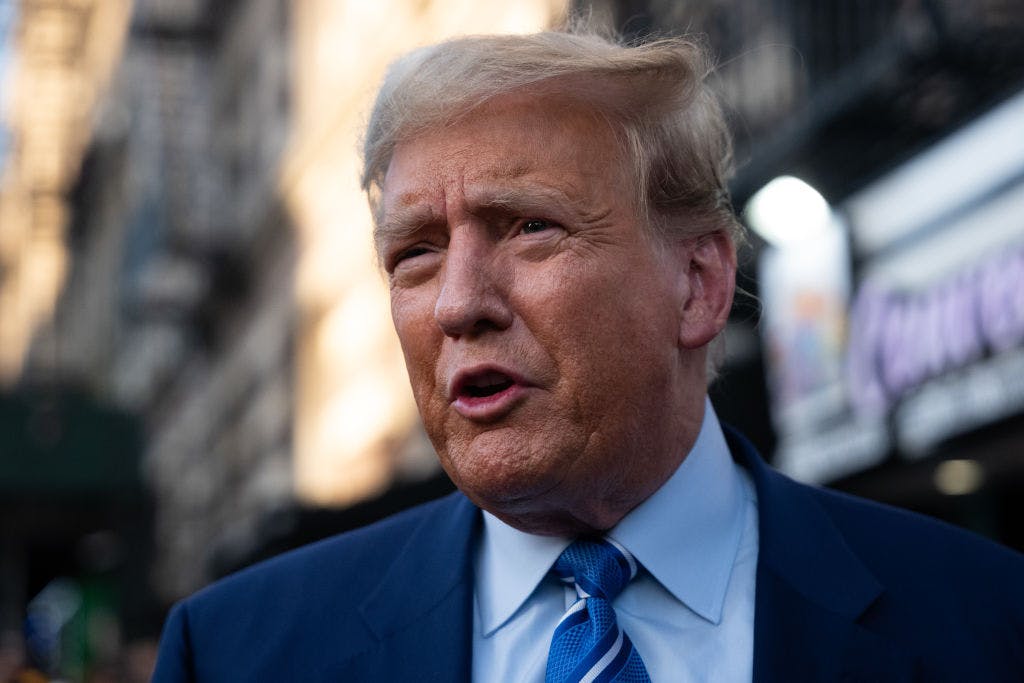What Is the Problem With Trump Getting a Day To Attend the Supreme Court Arguments on His Case?
The justices will hear Trump v. United States next week without the 45th president in attendance. The Stormy Daniels judge — and Trump himself — might both learn something from making the trip.

When the justices hear next week oral arguments in the case of Trump v. United States, President Trump won’t be there. That’s what Judge Juan Merchan, told Mr. Trump’s attorney, Todd Blanche, at Manhattan. “Your client is required to be here. He’s not required to be in the Supreme Court.” Judge Merchan allowed that “arguing before the Supreme Court is a big deal, and I can certainly appreciate why your client would want to be there.”
So do we. The immunity case before the Nine could reshape the powers of the presidency. Mr. Trump’s view that former presidents are entitled to “absolute” immunity for official acts while in office has been seen as an eccentric one, but at least four justices thought it viable. The issue not only cuts to the constitutional quick — it also could be the difference between Mr. Trump living free or living in stir. It makes hush money look like penny stakes.
Judge Merchan’s reminder to Mr. Blanche that a “trial in New York Supreme Court … is also a big deal” is no doubt apparent to Mr. Trump, cooped up in his courtroom. It also is a rhetorical sleight of hand — the United States Supreme Court is the highest court in the land, and New York’s Supreme Court is an entry level venue of the Empire State’s judiciary. It is no disrespect to state court to observe that Mr. Bragg’s charges are the judicial version of Off-Broadway.
Judge Merchan appeared more sympathetic to allowing Mr. Trump to attend his son Barron’s graduation than arguments before the high court. Those arguments also emerge from a criminal case against the 45th president. Mr. Trump is a defendant in federal court, too. Does anyone doubt that Judge Merchan would reschedule if he himself had a date before the Nine? Couldn’t he schedule a day off for Thursday rather than the habitual Wednesday?
This is not the first time that Judge Merchan has shown hostility to the intrusion of the immunity issue. He rebuffed Mr. Trump’s request to delay the trial until after the Supreme Court rules, calling that ask so “untimely” as to raise “real questions about the sincerity and actual purpose of the motion.” In February, the jurist observed that “the issue of the state proceedings I don’t believe is for the Supreme Court.” That was an inappropriate remark.
The January 6 case, in any event, is frozen pending that appeal. Judge Merchan could turn out to be correct that the case before him has nothing to do with the insulation provided for the president by the Framers. Nor do we suggest he’s not king of his courtroom, and that criminal charges, of whatever kind, are serious. The defendant, though, enjoys the presumption of innocence. The federal system, though, does not require separate universes.
It is true that Mr. Trump’s attorneys have dug him a hole from which even the justices might not be able to pull him out. They failed to contest the finding of a federal judge, Alvin Hellerstein, that the “evidence overwhelmingly suggests” that the Stormy matter was “a purely a personal item of the President.” They also failed to dispute that “money paid to an adult-film star is not related to a President’s official acts.” Judge Merchan has marked the point.
Is it not impossible, though, to imagine the justices siding — in whole or in part — with Mr. Trump’s immunity argument. His lawyers are likely already weighing how such a ruling impacts all of the cases against the former president. In this case, say, Mr. Trump, while in office, sent checks to his former lawyer, Michael Cohen. Now that we think on it, maybe Judge Merchan and Mr. Trump can take a road trip together for a day at 1 First Street.

